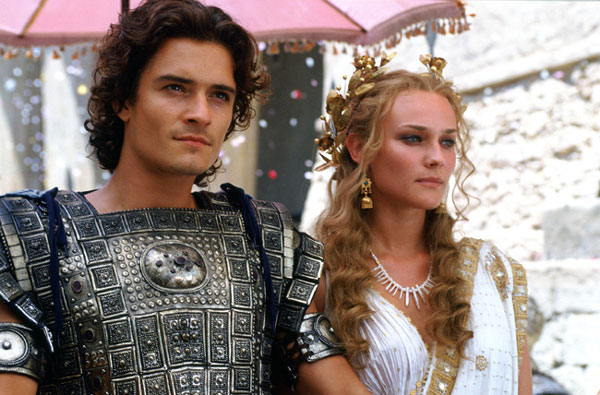Movie review by Greg Carlson
“Troy,” director Wolfgang Petersen’s spin on the uber-classic Homeric epic “The Iliad,” turns out to be another link in the chain of outstanding sword-and-sandal camp. More a testament to Brad Pitt’s considerable biceps and rippled six-pack abs than a serious philosophical treatise on war, love, honor, and immortality, “Troy” obediently fills in all the genre clichés crucial to its survival as an ostentatious, posturing addition to the canon. The movie is very freely adapted from the literature that inspired it, and many have groused about the tweaked storylines and the absent Olympian gods and goddesses. Nobody seems to mind, however, that interminable catalogues of ships aren’t included, so the loss of Zeus, Apollo, and the rest of the gang is surely no catastrophe for something intended to be enjoyed with Coca-Cola, hot buttered popcorn, and air-conditioning.
The script of “Troy” is credited to David Benioff, who manages to simultaneously pen ridiculously awful dialogue and harness the essential emotional framework of Homer’s vast canvas. The clichés are abundant, but it must be noted that the source material more or less set the stage for every epic written since the ninth century B.C. Yes, characters mostly end up reduced to single epithets (Odysseus = clever, Priam = wise, Helen = beautiful, etc.), but the movie adroitly manages to juggle more than half a dozen different storylines. If the script has a fatal flaw (aside from the clunky, self-important speeches), it is manifested in the laborious, heavy-footed way in which the movie contents itself with alternating so regularly between battles and discussions about battles.
Pitt mostly tosses out the usual tics he brings to his characters, and instead invests Achilles with a brooding, quasi-existentialist streak. The greatest warrior of all time is a juicy role to play, and it is surely to Pitt’s credit that his performance takes into account the tumultuous combination of rage, narcissism, and scoffing, misanthropic derision that makes Achilles and his attendant hubris so compelling. Eric Bana’s Hector is a worthy foil, with his deeply ingrained sense of family duty and self-sacrificing resignation to his fate. Bana understands that Hector is a guy who knows he cannot beat Achilles, but goes out to lock swords with him anyway. The pair’s one-on-one clash is one of the movie’s highlights, a visceral gut-punch that tops anything from “Gladiator.”
Like all great movies set in antiquity, one of the most enjoyable aspects of “Troy” can be found in the outrageous hairstyles and over-the-top togas and tunics worn by the cast. While the women, including German model Diane Kruger as Helen, Saffron Burrows as Andromache, and Rose Byrne as Briseis ,don’t fare too badly in the costume and coiffure department, the men are on display like Greece was sponsoring Versace’s spring runway show. Elaborate hair extensions, complete with gold clips, layered curls and perfectly-placed braids, festoon the handsome heads of Pitt, Bana, and Orlando Bloom, who spends most of his screen time looking uncomfortable that he has to play Paris as such a cowardly pretty-boy.
The older actors tear through their roles with both hands, however, and as King Priam, Peter O’Toole magnificently navigates several tricky scenes in which he is paired with younger fellows mostly out of their depth. Brian Cox goes ballistic as Agamemnon, Brendan Gleeson is in his usual fine form as the cuckolded Menelaus, and Sean Bean has more fun with Odysseus than the script seems to afford. “Troy” won’t be the last version of “The Iliad” to hit the big screen with a combination of veteran character actors and hot young stars, but for what it is worth, it’s likely to best many of its contenders.
